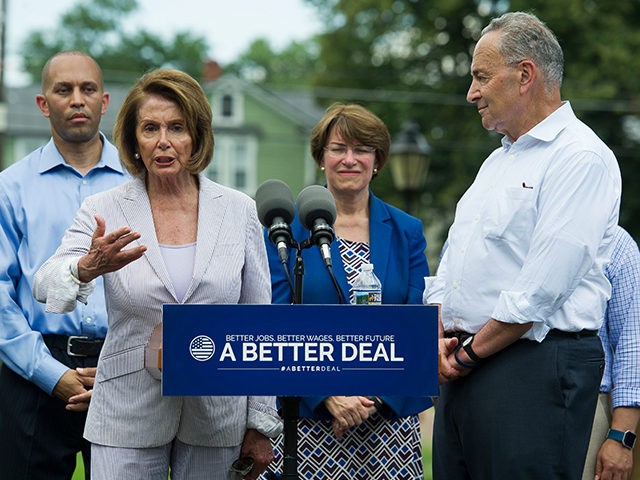When Donald Trump triumphed in his bid for the White House last fall after a campaign that often deployed attacks on President Barack Obama’s trade policies, many leading Democrats began questioning how they had lost control of an issue that once propelled them to victory.
The answer may be the old adage George W. Bush once mangled: “Fool me once, shame on you. Fool me … You can’t get fooled again.”
In an effort to recapture the trade issue, Senate Democrats on Wednesday began to roll out trade proposals that would have not been out of place at one of those boisterous Trump rallies, including renegotiating NAFTA, bolstering “Buy America” policies, and cracking down on unfair trade practices. Despite this shift in the rhetoric of Democratic leaders on those issues, Democrats may still struggle to overcome historical and political challenges to the public perception of the party’s trade stance.
“For too long, big corporations have dictated how trade deals and foreign acquisitions are negotiated and the American worker has been left without a seat at the table,” the Democrats said in a “trade blueprint” issued Wednesday.
The blueprint avoided any mention of Obama, whose administration had been behind many of those trade deals for the past eight years. Just one year ago, Obama was declaring that his administration’s push to pass the Trans-Pacific Partnership deal would overcome Democratic resistance. In doing so, he hinted that Democratic opposition to the TPP was an election year political strategy that would be set aside when it came time to make policy.
“I know that the politics around trade can very difficult–especially in an election year,” Obama said in an interview with the Straits Times of Singapore. “But the answer isn’t to turn inward and embrace protectionism.”
Hillary Clinton, under pressure from TPP opponent Bernie Sanders and his supporters, had abandoned her previous support for the deal. The credibility of this flip was undermined, however, when Virginia governor Terry McAuliffe, a longtime Clinton ally, told Politico that she would reverse herself again after the election. Clinton campaign chairman John Podesta claimed that McAuliffee was “flat wrong.”
The legacy of Democratic reversals on trade extends further than the last election-cycle. Obama lambasted George W. Bush’s trade policies during the 2008 campaign, only to embrace many similar policies and trade deals once in office.
Capitol Hill Democrats had already followed this path of talking tough on trade and then supporting trade deals once in power. Attacks on Bush’s trade policies helped sweep the Democrats to victory in 2006. But once in control of the House of Representatives, Democrats worked with the Bush administration in its efforts to pass trade deals with Colombia, Peru, Panama, and South Korea. “Bush and Democrats in Accord on Trade Deals,” the New York Times reported on May 11, 2007.
Democrats insisted that the trade agreements include labor standards and environmental protection measures. But these were not aimed at protecting American workers. The labor provisions, for example, sought to guarantee foreign workers the right to unionize.
Senator Charles Schumer (D-NY), one of the leaders of the Democrats’ “Better Deal” initiative on trade and other matters, has a record that reflects his party’s. He voted against a free-trade agreement with Oman one month prior to the 2006 election but supported a free-trade deal with Peru one month after the election. Once Obama was in office, Schumer voted for the Korea and Panama free-trade deals.
Underlying this history of reversals on trade policy is the difficult political reality Democrats face on trade. Most Democrats are free traders. According to a Pew Poll from April 25, 67 percent of Democrats say that free trade benefits the U.S. Fifty-four percent say free trade agreements have helped their personal financial situation. Among Republicans, just 36 percent say free trade is good for the country, and 35 percent say it benefits them personally. While Trump has pulled the Republican party further away from trade, Democrats have been more supportive of free trade since at least 2009.
But Democrats need those voters that oppose free trade to achieve electoral victories, particularly because these include among their ranks many union members and progressive activists. So Democrats are perennially tempted to ramp up the rhetoric on trade around elections while reverting to the actual majority preference of their party when governing.
The troubled politics of trade for Democrats on trade was evident on election day. An NBC News exit poll on election day found that 48 percent of Clinton voters said that trade with other countries creates more U.S. jobs, while 26 percent of Clinton supporters said it takes away U.S. jobs. Trump’s voters had far more unity on trade with fifty-seven percent saying it destroys U.S. jobs.
With a “Better Deal,” Democrats are offering a politically fraught promise to adopt trade policies that defy the preferences of the majority of Democratic voters. For that to be effective at winning voters, Democrats will have to convince trade skeptics that this time it will be different.

COMMENTS
Please let us know if you're having issues with commenting.